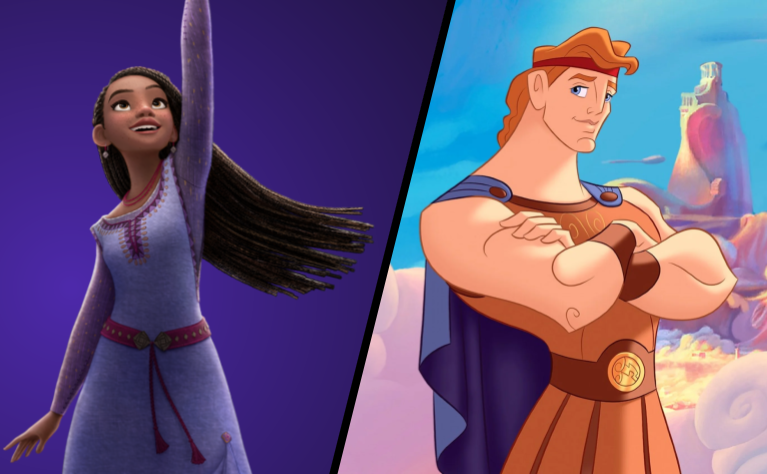It’s no secret that Disney movies haven’t been great in recent years. With only a few exceptions, most of Disney’s live-action remakes and TV reboots have done nothing to inspire their disappointed fan-base. Although you could blame this on their recent lack of animation or music quality, most of their recent movies have flopped due to poor storytelling.
And part of this poor storytelling comes from the lack of a strong desire. We’ve talked about desires before on the blog before, but there is a crucial element to writing desires that Disney, and many other studios, have been missing recently.
What crucial element do I mean? What does it mean for your main character to have a good desire? What could ultimately make it stronger, clearer, and more relatable?
In order to answer these questions, I’m going to compare and contrast two Disney films: The classic Hercules and Disney’s recent film Wish.
Hercules
Hercules has always known that he doesn’t fit in in his ancient Greek society. Despite being blessed with incredible super strength, his powers always seem to get him in trouble. Every time he tries to help, he only ends up destroying the town or hurting the people around him. He’s always felt like he belonged somewhere else, but he couldn’t think of a place that would accept a freak like him.
That is, until the day his parents let him know he’s adopted. Apparently, he was found on the side of a road as a baby, and the only thing with him was the golden symbol of Zeus. Hercules is ecstatic to learn that he might have some connection with the gods, and goes out in search of answers.
Once he finds a way to communicate with Zeus, Hercules learns that he used to be a god as well, the very son of the king of the gods. However, before he can regain his place in Olympus, he has to prove himself a true hero on earth.
He sets out on a quest to become this true hero, and finally satisfy his desire to be where he belongs.
Wish
Asha lives in a kingdom that is centered around one thing: Wishes. When you turn eighteen, you give your heart’s desire to the wizard-King Magnifico and he keeps them safe for you before eventually granting them at an annual event. Since Asha’s Grandfather is about to turn one-hundred years old, all Asha wants is for him to get his wish granted at the next upcoming ceremony before it’s too late for him to see his dream come true.
However, when Asha tries out for the role of apprentice to King Magnifico, she discovers a shocking secret: Not everyone’s wishes are going to be granted. Some of them will be trapped with the king forever if she doesn’t do something.
So, Asha sings a song, wishes upon a star, and a magical creature comes to earth to help her defeat the evil king.
A Crucial Element to Your Character’s Desire
In every Disney movie, there is usually an ‘I Want’ song similar to this. It’s a musical solo where the protagonist gets to sing about their core desire in life (such as ‘When Will My Life Begin’ from Tangled, ‘Out There’ From The Hunchback of Notre Dame, or ‘Reflection’ from Mulan.) Although writers don’t get the privilege of including an ‘I want’ song into their novel, making sure your protagonist has a desire, and the right set-up around it, is crucial to any story. So let’s take a deep dive into Hercules and Asha’s ‘I Want’ songs to see exactly how Hercules succeeded while Wish failed.
Asha’s song, “This Wish” says: “So I make this wish/To have something more for us than this.” However, the definition of this is never really distinguished. The song itself doesn’t give any further context, nor does the rest of the movie. In fact, at the beginning of the story, there isn’t much of a problem. Everyone is content. Although it’s hinted that her country is worn out and lifeless because they don’t have desires driving them, this idea isn’t fleshed out. The viewer isn’t given a tangible understanding of how the current situation is bad for the otherwise-happy residents of Asha’s country. So, when Asha attempts to reclaim the wishes, it seems like she’s trying to repair something that wasn’t broken in the first place. Her desire isn’t compelling, because there wasn’t much for her to want.
This is different from Hercules’ “Go the Distance” where his desire is clear. He sings: “I have often dreamed of a far off place/ Where a hero’s welcome would be waiting for me.” He dreams of a way to improve his situation and find belonging where so far he’s been an outcast. He knows he doesn’t belong on earth, he knows there’s something better for him, so he’s venturing out to pursue it.
Feeling like you don’t belong is something most people relate to, so a majority of the audience is able to relate to Hercules. However, Asha’s desire isn’t clear, since she’s trying to fix what doesn’t need fixing. Thus the viewers weren’t able to connect with the protagonist or care for her at all.
Both Hercules and Asha want something. One wants to find where he belongs, and another to make her country better. But since the context, or the problem, surrounding each of their desires was different, one had way more substance than the other. Viewers struggle to cheer Asha on because they’re not given a clear reason for doing so, whereas Hercules is able to be a strong role model because his desire is relatable and direct.
Your story has to have a problem. Hercules spends the first few minutes of its film establishing what is wrong, while all Wish does is set up the world-building and show how motivated Asha is to get everyone’s wishes fulfilled. There has to be something, some sort of driving fear, some sort of painful emptiness, for the viewer and the protagonist to miss. Without a driving motivation, why pursue anything? If nothing is missing, why go looking for it?
If you look at any film, especially Disney films, their beginnings are filled with problems. Rapunzel has never seen anything beyond her tower. Quasimodo is horribly ugly and has been convinced that no one could ever truly love him. Mulan has a wild, tougher side that is unacceptable in her society. All of these protagonists have a reason to want something more than ‘this.’ Their ‘I Want’ songs are justified because there is a problem they’re seeking to fix. Write stories like Hercules, and not like Wish. Give your protagonists a problem, something in their world that is amiss. Don’t just have them wanting more, but give them a reason to want more. Then, build their desire around that problem. That problem will give your character’s desire a sense of urgency that allows them to become a far more compelling protagonist that your readers will care for till the end.



Let us know:
What characters have you noticed were more compelling because a part of their world was broken? How do you plan to use this idea in your current WIP?


Hello, I’m Sophia! I’m a child of God and I (if you couldn’t tell already) love to write! I’m also a total theater kid and strong dessert (specifically cupcake) enthusiast. For as long as I can remember, I’ve enjoyed both reading and making my own stories. I’m so glad I get to share with you what I’ve learned from some of my favorite (or sometimes least favorite) stories on this blog.


Wish would have been a significantly better movie, and Asha’s desire would have made much more sense, if the kingdom was some kind of dystopia. Think about it. Removing everyone’s innermost desire should have left everyone with no drive, no desire to improve their world, and little motivation to do anything neyond routine. People would therefore be much easier to control, and that’s how the king stays in power. It would be a perfect setup, as there would be an obvious, major problem. What do you think?
Yes, that would have been the perfect set-up! They hinted at the effects of removing the wishes a little bit, but the idea was never fully expanded. A dystopian background would definitely work wonders with this story.